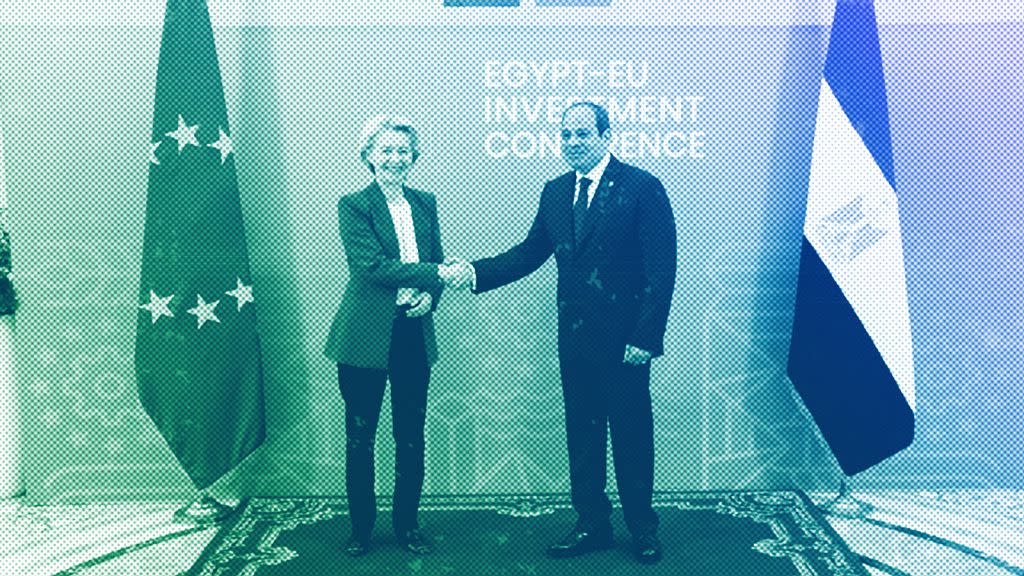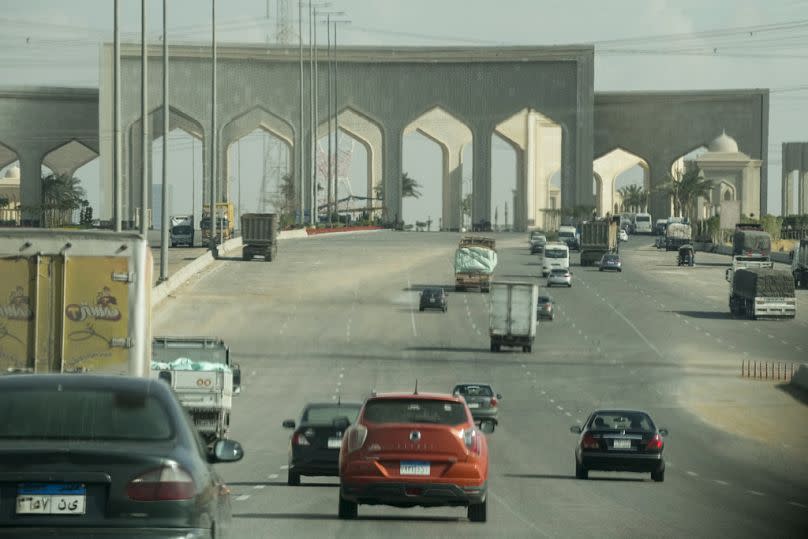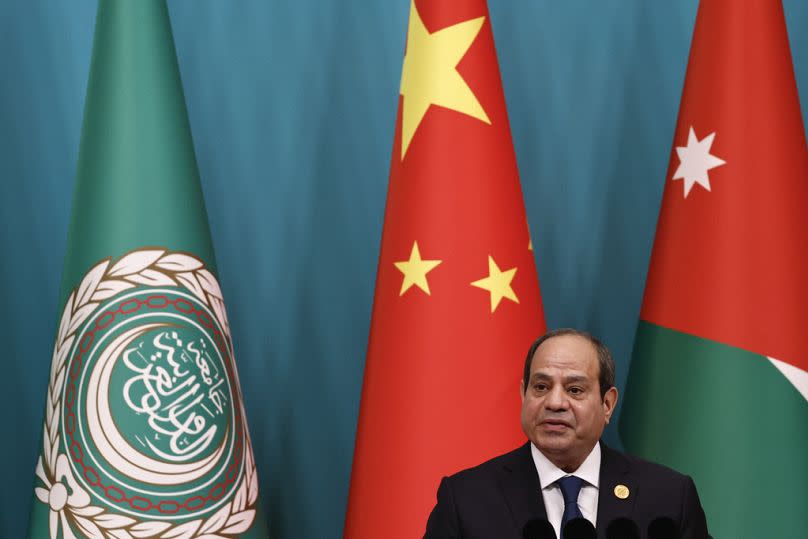After giving Egypt €7.4bn, Brussels must abide by its own rules and insist on human rights reforms

As EU leaders are giving a further €7.4 billion in aid and loans to Egyptian President Abdelfattah al-Sisi, they should ask themselves a question: what do the owner of Egypt’s largest dairy products and juice producer, Egypt’s former top auditor and anti-corruption official and a dozen peaceful protesters holding up a sign saying “you made us hungry, Sisi”, have in common?
The answer is that all have been imprisoned merely for disagreeing with the Egyptian government’s economic policies. Egypt is once again going through a severe economic crisis and, for the third time in the last 11 years, is seeking aid from the international community.
Yet despite receiving about €140bn since 2013, the lives of most Egyptians have continued to deteriorate, with more loans and bailouts needed to keep the country afloat. Egyptians instead got to witness tens of billions being squandered on vanity projects.
But who is there to hold the government accountable? The authorities have brutally and systematically silenced peaceful dissent, nearly wiped out independent media and civil society, repressed political opposition, adopted and enacted repressive legislation, jailed tens of thousands of actual or perceived critics and severely undermined the independence of the judiciary and of the legal profession.
Funding pledge rubberstamps 'golden age'
In turn, this has contributed to the government’s failure to respect, protect and fulfil people’s social and economic rights. As millions are increasingly experiencing hunger and impoverishment, the fight (nationwide protests) or flight (migration) options are kept in check by an extremely repressive security apparatus.
In a Europe where recent elections have been dominated by anxiety over migration, there is every reason to be worried about Egypt.
The country, with a population of over 110 million, is at the heart of a deeply unstable area, bordering Libya, Sudan, Israel and Palestine. However, Egyptian authorities have long pointed to its stability and ability to control irregular migration towards Europe.

When the Egyptian economy seemed on the verge of collapse last May, it was no wonder that the EU felt obliged to jump in to help.
A new "golden age" of relations between Egypt and the EU has just been rubberstamped by President Ursula von der Leyen’s announcement of €7.4bn in EU loans and funding as part of a new strategic partnership.
In principle, the EU recognises that human rights and the rule of law are key to economic prosperity. EU regulations on granting financial assistance to third states explicitly list “respect of human rights and effective democratic mechanisms ... and rule of law” among their preconditions.
EU companies to sign 40 billion euros' worth of deals with Egypt
Analysis: The EU's big bet on Egypt comes with a high price and high risks
However, in the case of Egypt, the council decision governing the financial aid adopted softer requirements, merely that Egypt “demonstrates” that it “continues to make concrete and credible steps towards ... effective democratic mechanisms, including rule of law ... and guaranteeing respect for human rights.”
No respect for human rights without pressure
While the UN, human rights organisations and even the US government disagree with the claim that Egypt has actually made concrete or credible reforms, Amnesty International, along with 15 leading Egyptian and international human rights organisations, wrote to the EU and its member states laying out how the EU-Egypt deal should respect EU law and in so doing positively contribute to addressing the root causes of economic instability.
First, the memorandum of understanding governing the transfer of funds must lay out a roadmap for structural reforms, with public, clear, specific and timebound indicators, targets and benchmarks for Egypt to meet its human rights obligations.
Without real pressure, the Egyptian authorities will not undertake any reforms.

Second, EU leaders must insist that Egyptian authorities immediately and unconditionally release all those detained solely for the peaceful exercise of their human rights.
As long as the government imprisons those who disagree with its policies, it will forge ahead with the very same policies that led to its current economic crisis. This needs to change.
Third, the EU must ensure that Egyptian authorities open civic and political space by respecting the rights to freedom of expression, association and peaceful assembly, including in the lead-up to and aftermath of the 2025 parliamentary elections. If this is not addressed, then the government will continue to adopt repressive laws and operate without any scrutiny, with similar devastating results.
Spending the money in line with EU law
Finally, the European Parliament also has a role to play, regardless of where members sit in the chamber.
First and foremost, it must safeguard its oversight role. The European Council and Commission decided to bypass parliament's approval for €1bn, citing "urgent" financial needs by Egypt per article 213 of the EU treaty, irrespective of the fact that the deal was announced after the UAE committed €30bn to Egypt.
Secondly, as the EU is about to hand over billions to a neighbouring country, members of parliament have a responsibility to their voters to ensure that this money is spent in line with EU law.
The EU has the responsibility and opportunity to help Egypt change course. If it fails to do so, we will continue to have the same conversation, and Egyptians will continue to suffer.
Hussein Baoumi is Foreign Policy Advocate at Amnesty International's European Institutions Office (EIO).
At Euronews, we believe all views matter. Contact us at view@euronews.com to send pitches or submissions and be part of the conversation.


